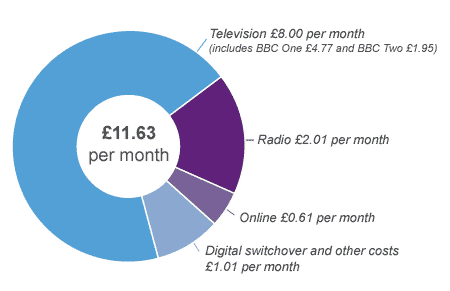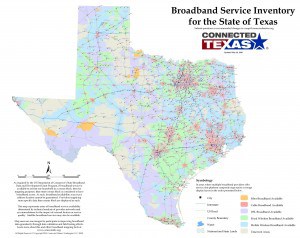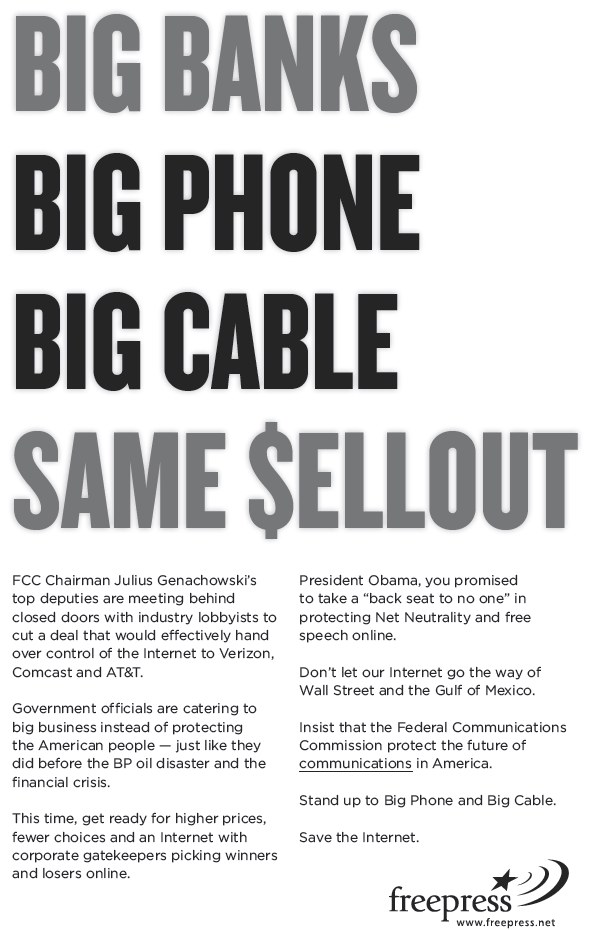
More dollar-a-holler advocacy for AT&T in the pages of CNET. AT&T brings the money, lobbyists ride their former credentials to deliver exactly the "facts" AT&T wants to read.
CNET last week shamefully handed over column space to a barely-disclosed AT&T lobbyist trotting out the latest unfounded, anti-consumer nonsense: tiered data plans help bring broadband to the poor.
It’s all part of AT&T’s Re-education campaign to sucker convince Americans that paying more for less service is a good thing:
New analysis shows that as Internet providers ramp up their investments to accommodate the surge in bandwidth demand, the old, one-price-for-everybody model would slow our progress toward universal adoption, especially by lower-income Americans.
The first reaction of many Internet users to this news may well be disbelief. How can it be that a pricing approach that has worked so well for so many years can suddenly become obsolete and even counterproductive? The answer is that technological advances have changed what many of us do online, which, in turn, has changed the economics.
A techno-ecosystem once dominated by e-mail and text now is increasingly characterized by high-definition video that claims up to 1,000 times as much network capacity and bandwidth as simple text. The way we currently pay for the infrastructure required to keep the network humming also will have to change.
The only humming we hear is AT&T’s dollar bill-counting machines.
When at first you don’t succeed, try, try again. Robert J. Shapiro and his co-author Kevin Hassett’s latest work, “A New Analysis of Broadband Adoption Rates By Minority Households,” is simply a rehash — spoiled leftover bologna — of their last bought-and-paid-for-study we analyzed last fall. Both reports are tailor-made to appeal to the minority-interest groups that are part of AT&T’s Rainbow Coalition of Cash — groups that engage in dollar-a-holler advocacy of AT&T’s agenda while quietly depositing their substantial contribution checks.
The report assumes quite a lot:
- That broadband service adoption rates in minority communities are too low because heavy users are artificially keeping broadband prices too high;
- That without tiered data plans, AT&T can never afford to expand broadband service;
- That unlimited broadband tiers can never co-exist with tiered plans — it’s one-size-fits-all under today’s bad pricing model;
- That a grand exaflood is coming to swamp broadband users of all kinds, and without tiered pricing to finance upgrades, we could all drown.
For the second time, Shapiro and Hassett try to stick the bill for upgrades on so-called “heavy users,” who they suggest should pay 80 percent of the upgrade costs through higher priced broadband service. They also want content producers to cough up — the “they can’t use my pipes for free”-argument AT&T loves.
How will customers react to paying huge surcharges on their broadband bills? According to the report’s authors, heavy users won’t mind because they are “price-insensitive.”
Ask Time Warner Cable customers in New York, Texas, and North Carolina if they minded the prospect of paying $150 a month for broadband service they used to pay $50 a month to receive. How about Frontier’s customers in Mound, Minnesota asked to pony up $250 a month for up to 3Mbps DSL service because they exceeded Frontier’s 5GB monthly usage allowance?
The report has several other glaring fact-gaps:
- Tiered service plans are already available industry-wide, based on broadband speed, not usage. Low income customers can obtain cheaper broadband today, if companies decide to advertise it;
- The wounds from high broadband pricing are industry self-inflicted. They charge $40 or more for a service their financial reports suggest costs less than $10 a month to provide;
- Providers can achieve universal broadband first by extending existing networks to rural America, upgrading them to fiber as the economy of scale from urban and suburban upgrades forces prices down;
- The authors strenuously avoid reviewing providers’ financial reports which show enormous profits even as costs continue their rapid decline;
- Many of the footnotes used to back their arguments turn out to quote self-interested parties like service providers, equipment manufacturers, and trade associations.
None of this is surprising or new in bought-and-paid-for-reports commissioned by companies to cheerlead their corporate agenda. The last thing AT&T wants to read is a recitation of facts that disprove their arguments.
In essence, Shapiro and Hassett are arguing (with a straight face) that if providers are allowed to charge some consumers dramatically higher prices for broadband service, it will somehow convince them to upgrade their networks -and- trickle down lower prices for economically-challenged consumers.
Maybe if we let BP drill more oil wells in the Gulf, the extra profits they earn will somehow lead to better safety records for drilling and lower gas prices. After all, with those record-busting profits earned over the past three years, the safety record for the industry is better than ever and gas is sold at fire sale prices, benefiting economically disadvantaged Americans, right?
If you or I argued this theory, we’d be drug tested. For corporate lobbyists, it’s just another day at the office.
Here’s just how silly this really is: You just discovered your hard drive is nearly full. You’ve gone shopping for an upgrade, planning to spend around $100 for a new drive. Just a few years ago, you spent around that much for a 120GB model. Today, that same $99 would today buy you a 1.5 terabyte drive, unless you bought it from AT&T. They want $1,500.
You: “Why is this drive so expensive?”
AT&T: “Over 90 percent of our customers never need a drive bigger than 120 gigabytes. Developing a 1.5 terabyte drive costs plenty, and we feel that because you are a heavy user, you should bear the brunt of the development and manufacturing costs of all hard drives.”
You: “Sure, but this same 1.5TB drive is available in Korea for $99 dollars. You want $1,500. Why is there such a price difference and when does your price come down?”
AT&T: “Poor people in Korea and America can’t afford even a 60 gigabyte drive. We are trying to make smaller drives more affordable so in turn you should pay a higher price. This isn’t about when AT&T will lower our price, it’s about when you will see our grand charitable vision and lower your selfish expectation of a lower price.”
You: “Wow, a corporation with socially-conscious pricing to benefit the poor? So you are telling me that when I spend $1,500 on this hard drive, it is going to subsidize the cost of their 60 gigabyte drive, right?”
AT&T: “No, not exactly. See, if we didn’t charge you $1,500, we’d have to raise the price on their 60 gigabyte drive and that’s not fair because they don’t need to store as much as you do.”
You: “But wait, your ‘subsidized’ 60GB drive costs three times more than what Koreans spend for a drive at least three times larger.”
AT&T: “That’s because the standard of living is different there. Besides, why do you want to make the poor pay for your hard drive?”
You: “You aren’t making any sense.”
AT&T: “But we are about to make a whole lot of dollars!”
Dumping unlimited usage pricing only sets the profit expectations-bar higher for the broadband industry on Wall Street, regardless of what the true costs are to provide the service. Wall Street never argues that excess profits should be spent on network upgrades and price subsidies to the poor — they want those profits paid to shareholders instead.
When the telecom industry is paying for your study, real facts never matter. If you want them to do future business with your lobbying firm, the only acceptable conclusion is the one AT&T wants you to reach.
Tomorrow: Down the Sonecon rabbit hole


 Subscribe
Subscribe






